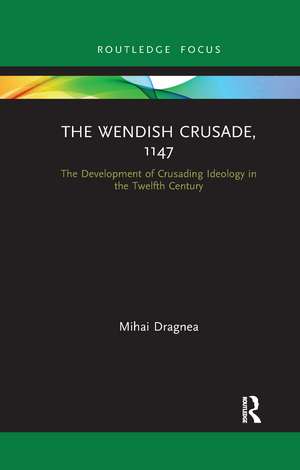The Wendish Crusade, 1147: The Development of Crusading Ideology in the Twelfth Century
Autor Mihai Dragneaen Limba Engleză Paperback – 30 sep 2021
Preț: 183.65 lei
Nou
Puncte Express: 275
Preț estimativ în valută:
35.14€ • 36.69$ • 29.02£
35.14€ • 36.69$ • 29.02£
Carte tipărită la comandă
Livrare economică 15-29 aprilie
Preluare comenzi: 021 569.72.76
Specificații
ISBN-13: 9781032177465
ISBN-10: 1032177462
Pagini: 76
Dimensiuni: 138 x 216 x 4 mm
Greutate: 0.1 kg
Ediția:1
Editura: Taylor & Francis
Colecția Routledge
Locul publicării:Oxford, United Kingdom
ISBN-10: 1032177462
Pagini: 76
Dimensiuni: 138 x 216 x 4 mm
Greutate: 0.1 kg
Ediția:1
Editura: Taylor & Francis
Colecția Routledge
Locul publicării:Oxford, United Kingdom
Notă biografică
Mihai Dragnea completed his doctoral research at the Romanian Academy ('Nicolae Iorga' Institute of History). The thesis entitled Mission and Crusade in the Wendish Territory, 12th Century was published in Romanian in 2019. His research interests include the relations between Germans and Wends during the High Middle Ages, with a focus on crusading and conversion. He is the current President of the Balkan History Association.
Cuprins
Foreword
List of abbreviations
1 Introduction
2 Crusade ideology in northern Europe and Bernard of Clairvaux
3 Forced conversion and the new canon law (ius novum)
4 The conquest of a pagan territory blessed by the church
5 Expanding the crusading ideal on the eastern shore of the Baltic
Conclusion
Index
List of abbreviations
1 Introduction
2 Crusade ideology in northern Europe and Bernard of Clairvaux
3 Forced conversion and the new canon law (ius novum)
4 The conquest of a pagan territory blessed by the church
5 Expanding the crusading ideal on the eastern shore of the Baltic
Conclusion
Index
Descriere
The Wendish Crusade of 1147, one of the Northern Crusades and a part of the Second Crusade, took place at a critical phase in the evolution of crusading rhetoric. The initiators and apologists of the campaign employed rhetorical devices to justify the occupation of a region and conversion of a population under the auspices of a crusade. A detailed examination of the primary sources shows that the justification of a crusade against apostates was not only a German endeavour, or the pope's will, but a political reality of the twelfth century. Therefore, the attitude of the papacy is shown to be reactive rather than proactive.
